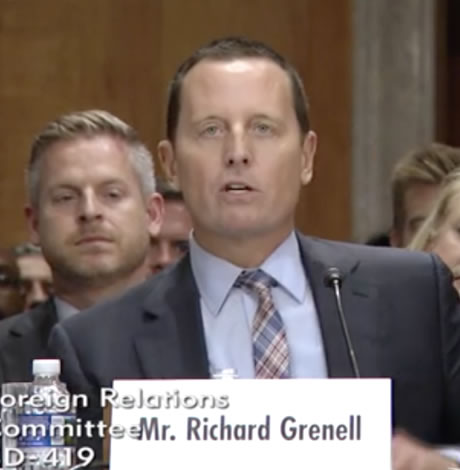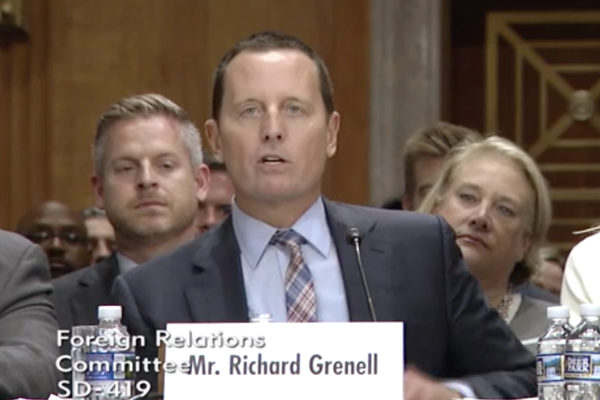News
Ric Grenell in ’92: ‘Only whores and very small children wear red shoes’
Trump’s gay nominee has history of derogatory comments about women


Richard Grenell said in 1992: “Only whores and very small children wear red shoes.”
(Screen capture public domain)
President Trump’s nominee for U.S. ambassador to Germany — the first major openly gay appointment of the administration — came under fire in the recent past for snide comments on Twitter about the physical appearance of several prominent women — but a 1995 Washington Post profile story on him reveals he was making such comments long before the arrival of social media.
The more than 20-year-old profile piece on Ric Grenell, sent to the Washington Blade on Saturday, takes a look at his personality long before the Trump nominee served as spokesperson for the U.S. mission to the United Nations during the George W. Bush administration or as a Fox News commentator. The piece was written during Grenell’s days as press secretary to Rep. Mark Sanford (R-S.C.) at the dawn of the “Gingrich Revolution.”
A key portion of the profile quotes Laurie Blackford, then a producer for Chris Matthews long before he came to MSNBC, recalling remarks Grenell allegedly made to a fellow campaign staffer on the 1992 Bush-Quayle re-election campaign.
“One of our staff people came in and had on a flowery dress and red shoes and Ric looked at her and said, ‘Didn’t your mother ever tell you only whores and very small children wear red shoes?'” Blackford is quoted as saying.
At the time the profile piece was written three years later, the Post sought a response on the remarks from Grenell, who acknowledged them as a joke.
“You know that was a joke,” Grenell is quoted as saying while chuckling. “But come on. Red shoes?”
The remarks are consistent with comments Grenell has made about women on Twitter. One 2011 tweet directed at Rachel Maddow, the lesbian MSNBC host, said she “needs to take a breath and put on a necklace” and another compared her look to that of pop singer Justin Bieber.
One tweet directed at Callista Gingrich questioned whether she “snaps on” her hair. At around the same time, Grenell tweeted Hillary Clinton “is starting to look like Madeleine Albright.”
Grenell, who also has a history of antagonizing reporters on Twitter, deleted and apologized for those tweets years ago during his brief tenure of several days with Mitt Romney’s 2012 presidential campaign. Although some point to the tweets as the reason he didn’t last long with the campaign, others say the appointment of a gay person to the GOP campaign was nixed after objections from anti-gay activists.
During Grenell’s confirmation hearing last week, Sen. Chris Murphy (D-Conn.) queried him about his comments on Twitter about women, asking him if he regrets those words and can understand the concern about the impact they’ll have on his role in Germany.
“Anybody who knows me knows that I am a very caring person and very sensitive — and I also appreciate good humor,” Grenell said in response. “Unfortunately, there are times where what was intended to be humorous turned out to be not so humorous, and, again, that was never my intention and I regret that.”
The 1995 Post profile piece — written before Grenell met his partner of 15 years, Matt Lashey — never mentions Grenell’s sexual orientation.
The article, titled “Republican Party Animal,” says the then 28-year-old Grenell “is not really in the market for a relationship” between “working out twice a day, playing softball with Hill friends and just getting through each day’s work.”
“I have no time,” Grenell is quoted as saying. “It wouldn’t be fair.”
The article also quotes Blackford as saying Grenell was “the most perfect-looking person — perfectly pressed and dressed.”
Despite Grenell’s support for Trump and other GOP presidential candidates, the article calls him a fan of then-first lady Hillary Clinton.
But the article also quotes Grenell as expressing consternation over the election of Bill Clinton in 1992 over incumbent President George H.W. Bush.
“I don’t even like it when people say Clinton won. A majority of the people did not vote for him,” Grenell is quoted as saying. “Not only had my candidate lost, but I also lost my job. I felt that we had truly let President Bush down and I was depressed.”
Grenell didn’t respond to the Blade’s request for comment on the 1992 remarks about women at the time of his nomination to the Trump administration. Although the Senate has held a confirmation hearing, it has yet to hold a vote on his confirmation as U.S. ambassador to Germany.
Kansas
ACLU sues Kansas over law invalidating trans residents’ IDs
A new Kansas bill requires transgender residents to have their driver’s licenses reflect their sex assigned at birth, invalidating current licenses.

Transgender people across Kansas received letters in the mail on Wednesday demanding the immediate surrender of their driver’s licenses following passage of one of the harshest transgender bathroom bans in the nation. Now the American Civil Liberties Union is filing a lawsuit to block the ban and protect transgender residents from what advocates describe as “sweeping” and “punitive” consequences.
Independent journalist Erin Reed broke the story Wednesday after lawmakers approved House Substitute for Senate Bill 244. In her reporting, Reed included a photo of the letter sent to transgender Kansans, requiring them to obtain a driver’s license that reflects their sex assigned at birth rather than the gender with which they identify.
According to the reporting, transgender Kansans must surrender their driver’s licenses and that their current credentials — regardless of expiration date — will be considered invalid upon the law’s publication. The move effectively nullifies previously issued identification documents, creating immediate uncertainty for those impacted.
House Substitute for Senate Bill 244 also stipulates that any transgender person caught driving without a valid license could face a class B misdemeanor, punishable by up to six months in jail and a $1,000 fine. That potential penalty adds a criminal dimension to what began as an administrative action. It also compounds the legal risks for transgender Kansans, as the state already requires county jails to house inmates according to sex assigned at birth — a policy that advocates say can place transgender detainees at heightened risk.
Beyond identification issues, SB 244 not only bans transgender people from using restrooms that match their gender identity in government buildings — including libraries, courthouses, state parks, hospitals, and interstate rest stops — with the possibility for criminal penalties, but also allows for what critics have described as a “bathroom bounty hunter” provision. The measure permits anyone who encounters a transgender person in a restroom — including potentially in private businesses — to sue them for large sums of money, dramatically expanding the scope of enforcement beyond government authorities.
The lawsuit challenging SB 244 was filed today in the District Court of Douglas County on behalf of anonymous plaintiffs Daniel Doe and Matthew Moe by the American Civil Liberties Union, the ACLU of Kansas, and Ballard Spahr LLP. The complaint argues that SB 244 violates the Kansas Constitution’s protections for personal autonomy, privacy, equality under the law, due process, and freedom of speech.
Additionally, the American Civil Liberties Union filed a temporary restraining order on behalf of the anonymous plaintiffs, arguing that the order — followed by a temporary injunction — is necessary to prevent the “irreparable harm” that would result from SB 244.
State Rep. Abi Boatman, a Wichita Democrat and the only transgender member of the Kansas Legislature, told the Kansas City Star on Wednesday that “persecution is the point.”
“This legislation is a direct attack on the dignity and humanity of transgender Kansans,” said Monica Bennett, legal director of the ACLU of Kansas. “It undermines our state’s strong constitutional protections against government overreach and persecution.”
“SB 244 is a cruel and craven threat to public safety all in the name of fostering fear, division, and paranoia,” said Harper Seldin, senior staff attorney for the ACLU’s LGBTQ & HIV Rights Project. “The invalidation of state-issued IDs threatens to out transgender people against their will every time they apply for a job, rent an apartment, or interact with police. Taken as a whole, SB 244 is a transparent attempt to deny transgender people autonomy over their own identities and push them out of public life altogether.”
“SB 244 presents a state-sanctioned attack on transgender people aimed at silencing, dehumanizing, and alienating Kansans whose gender identity does not conform to the state legislature’s preferences,” said Heather St. Clair, a Ballard Spahr litigator working on the case. “Ballard Spahr is committed to standing with the ACLU and the plaintiffs in fighting on behalf of transgender Kansans for a remedy against the injustices presented by SB 244, and is dedicated to protecting the constitutional rights jeopardized by this new law.”
National
After layoffs at Advocate, parent company acquires ‘Them’ from Conde Nast
Top editorial staff let go last week

Former staff members at the Advocate and Out magazines revealed that parent company Equalpride laid off a number of employees late last week.
Those let go included Advocate editor-in-chief Alex Cooper, Pride.com editor-in-chief Rachel Shatto, brand partnerships manager Erin Manley, community editor Marie-Adélina de la Ferriére, and Out magazine staff writers Moises Mendez and Bernardo Sim, according to a report in Hollywood Reporter.
Cooper, who joined the company in 2021, posted to social media that, “Few people have had the privilege of leading this legendary LGBTQ+ news outlet, and I’m deeply honored to have been one of them. To my team: thank you for the last four years. You’ve been the best. For those also affected today, please let me know how I can support you.”
The Advocate’s PR firm when reached by the Blade said it no longer represents the company. Emails to the Advocate went unanswered.
Equalpride on Friday announced it acquired “Them,” a digital LGBTQ outlet founded in 2017 by Conde Nast.
“Equalpride exists to elevate, celebrate and protect LGBTQ+ storytelling at scale,” Equalpride CEO Mark Berryhill said according to Hollywood Reporter. “By combining the strengths of our brands with this respected digital platform, we’re creating a unified ecosystem that delivers even more impact for our audiences, advertisers, and community partners.”
It’s not clear if “Them” staff would take over editorial responsibilities for the Advocate and Out.

In an official statement released at the reveal event Capital Pride Alliance described its just announced 2026 Pride theme of “Exist, Resist, Have the Audacity” as a “bold declaration affirming the presence, resilience, and courage of LGBTQ+ people around the world.”
The statement adds, “Grounded in the undeniable truth that our existence is not up for debate, this year’s theme calls on the community to live loudly and proudly, stand firm against injustice and erasure, and embody the collective strength that has always defined the LGBTQ+ community.”
In a reference to the impact of the hostile political climate, the statement says, “In a time when LGBTQ+ rights and history continue to face challenges, especially in our Nation’s Capital, where policy and public discourse shape the future of our country, together, we must ensure that our voices are visible, heard, and unapologetically centered.”
The statement also quotes Capital Pride Alliance CEO and President Ryan Bos’s message at the Reveal event: “This year’s theme is both a declaration and a demand,” Bos said. “Exist, Resist, Have Audacity! reflects the resilience of our community and our responsibility to protect the progress we’ve made. As we look toward our nation’s 250th anniversary, we affirm that LGBTQ+ people have always been and always will be part of the United States’s history, and we will continue shaping its future with strength and resolve,” he concluded.
-

 Mexico5 days ago
Mexico5 days agoUS Embassy in Mexico issues shelter in place order for Puerto Vallarta
-

 Netherlands4 days ago
Netherlands4 days agoRob Jetten becomes first gay Dutch prime minister
-

 Sports4 days ago
Sports4 days agoMore than a dozen LGBTQ athletes medal at Olympics
-

 Books3 days ago
Books3 days agoNew book profiles LGBTQ Ukrainians, documents war experiences

















